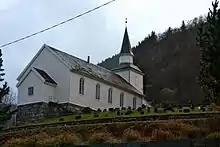Brekke Church
Brekke Church (Norwegian: Brekke kyrkje) is a parish church of the Church of Norway in Gulen Municipality in Vestland county, Norway. It is located in the village of Brekke. It is the church for the Brekke parish which is part of the Nordhordland prosti (deanery) in the Diocese of Bjørgvin. The white, wooden church was built in a long church style in 1862 using designs by the architect Christian Henrik Grosch. The church seats about 390 people.[1][2]
| Brekke Church | |
|---|---|
| Brekke kyrkje | |
 View of the church | |
 Brekke Church Location of the church  Brekke Church Brekke Church (Norway) | |
| 61.0193°N 5.4601°E | |
| Location | Gulen Municipality, Vestland |
| Country | Norway |
| Denomination | Church of Norway |
| Churchmanship | Evangelical Lutheran |
| History | |
| Former name(s) | Risnefjord Church |
| Status | Parish church |
| Founded | 13th century |
| Consecrated | 19 Nov 1862 |
| Architecture | |
| Functional status | Active |
| Architect(s) | Christian Heinrich Grosch |
| Architectural type | Long church |
| Completed | 1862 |
| Specifications | |
| Capacity | 390 |
| Materials | Wood |
| Administration | |
| Parish | Brekke |
| Deanery | Nordhordland prosti |
| Diocese | Bjørgvin |
History
The earliest existing historical records of the church at Brekke date back to the year 1327, but it was not new that year. The first church was likely a stave church and it was known as the Risnefjord Church (Old Norse: Risnapyrdi), after the local fjord (it was later named Brekke Church). There was also a small annex chapel located on the Haugland farm, about 400 metres (1,300 ft) to the south of the village of Brekke. Both churches are mentioned in the same source from 1327. The Haugland Chapel is not mentioned in any sources after about 1340.[3][4]
Around 1591, the old church was torn down and a new church was built in the village of Brekke, just up the hill from the shoreline. In 1686, the wooden church was described as a small, log building with tower. The nave measured about 9.4 by 6.9 metres (31 ft × 23 ft) and the choir measured 5.6 by 3.8 metres (18 ft × 12 ft). At that time, the building was described as in poor condition and uneven. The church had only room for 130 people and it was less than half the size of what the law required. The Church Act of 1851, instructed the local authorities to ensure that the churches should have room for at least 30% of the population of the parish. This (eventually) led to the old church being torn down and replaced.[5]
In 1862, a new church was constructed just south of the old church. The new church was consecrated on 19 November 1862 by the local Dean Thomas Erichsen. After the new church was consecrated, the old church was torn down. The new church was larger, having a nave measuring 16.8 by 10.2 metres (55 ft × 33 ft) and a square choir with each side measuring 5.1 metres (17 ft). The new church had a small tower and right away, the residents of the parish were unhappy with the design of the tower. It wasn't until a renovation that was completed in 1939 that gave the parish a new, taller tower that was covered in a copper roof.[6][7]
See also
References
- "Brekke kyrkje". Kirkesøk: Kirkebyggdatabasen. Retrieved 2019-11-30.
- "Oversikt over Nåværende Kirker" (in Norwegian). KirkeKonsulenten.no. Retrieved 2019-11-30.
- "Haugland kyrkjestad" (in Norwegian). Norwegian Directorate for Cultural Heritage. Retrieved 2019-11-30.
- Diocesis Bergensis (1843). Munch, Edvard (ed.). Registrum prædiorum et redituum ad ecclesias diocesis Bergensis sæculo P.C. XIV (in Latin). Christiania, Norge: Guldberg & Dzwonkowski. p. 52. ISBN 9781294184645. Retrieved 2019-11-30.
- "Brekke kyrkjestad" (in Norwegian). Norwegian Directorate for Cultural Heritage. Retrieved 2019-11-30.
- Henden Aaraas, Margrethe; Vengen, Sigurd; Gjerde, Anders. "Brekke kyrkje" (in Norwegian). Fylkesarkivet. Retrieved 2019-11-30.
- Aaraas, Margrethe Henden; Dupedal, Torkjell; Vengen, Sigurd; Førsund, Finn Borgen (2000). På kyrkjeferd i Sogn og Fjordane. 2. Førde: Sogn. ISBN 8291722145.

